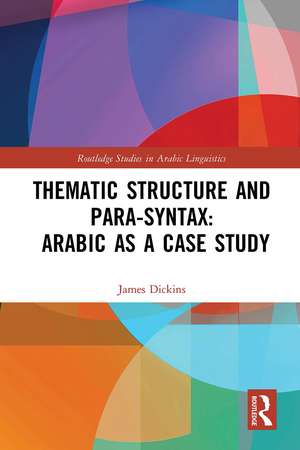Thematic Structure and Para-Syntax: Arabic as a Case Study: Routledge Studies in Arabic Linguistics
Autor James Dickinsen Limba Engleză Paperback – 29 aug 2022
Taking Arabic as a case study, this book claims that approaches to thematic structure propounded in universalist linguistic theories, of which Hallidayan systemic functional linguistics is taken as an illustrative example, are profoundly wrong. It argues that in order to produce an analysis of thematic structure and similar phenomena which is not undermined by its own theoretical presuppositions, it is necessary to remove such notions from the domain of linguistic and semiotic theory. The book initially focuses on Sudanese Arabic, because this allows for a beautifully clear exposition of general principles, before applying these principles to Modern Standard Arabic, and some other Arabic varieties.
This book will be of interest to scholars in Arabic linguistics, linguistic theory, and information structure.
| Toate formatele și edițiile | Preț | Express |
|---|---|---|
| Paperback (1) | 256.02 lei 6-8 săpt. | |
| Taylor & Francis – 29 aug 2022 | 256.02 lei 6-8 săpt. | |
| Hardback (1) | 763.39 lei 6-8 săpt. | |
| Taylor & Francis – 17 mar 2020 | 763.39 lei 6-8 săpt. |
Preț: 256.02 lei
Preț vechi: 324.43 lei
-21% Nou
Puncte Express: 384
Preț estimativ în valută:
48.100€ • 50.96$ • 40.45£
48.100€ • 50.96$ • 40.45£
Carte tipărită la comandă
Livrare economică 15-29 aprilie
Preluare comenzi: 021 569.72.76
Specificații
ISBN-13: 9781032400402
ISBN-10: 1032400404
Pagini: 176
Ilustrații: 14
Dimensiuni: 156 x 234 mm
Greutate: 0.26 kg
Ediția:1
Editura: Taylor & Francis
Colecția Routledge
Seria Routledge Studies in Arabic Linguistics
Locul publicării:Oxford, United Kingdom
ISBN-10: 1032400404
Pagini: 176
Ilustrații: 14
Dimensiuni: 156 x 234 mm
Greutate: 0.26 kg
Ediția:1
Editura: Taylor & Francis
Colecția Routledge
Seria Routledge Studies in Arabic Linguistics
Locul publicării:Oxford, United Kingdom
Notă biografică
James Dickins is Professor of Arabic at the University of Leeds.
Cuprins
Chapter 1: Introduction
Chapter 2: Signs, syntax, para-syntax, theme and rheme
2.1 Introduction
2.2 Signs
2.3 Grammar (morphology and syntax) as sign-level analysis
2.4 Syntax and para-syntax
Chapter 3: Issues in defining ‘theme’
3.1 Introduction
3.2 Theme as starting point of the utterance
Chapter 4: Recursion
4.1 Introduction
4.2 Recursion
Chapter 5: Summary of arguments so far
Chapter 6: Traditional Arabic grammar analysis of Arabic clause structure
6.1 Introduction
6.2 Traditional Arabic grammar analysis of Arabic clause structure
Chapter 7: Peri/Thema-Nuc/Rhema analysis of Standard Arabic
7.1 Introduction
7.2 Application of Peri/Thema-Nuc/Rhema analysis to Standard Arabic
7.3 Comparison with Baker’s (2011) analysis of Standard Arabic
7.4 Nuc/Rhema-markers and Peri/Thema-markers in Standard Arabic
7.5 A comparison with Arabic dialects and other languages
Chapter 8: Phrase-structural para-syntax in Arabic: beyond theme and rheme
8.1 Introduction
8.2 Initiality as non-thematic discourse marker in Arabic
8.3 Initiality as non-thematic discourse marker: Standard Arabic compared to other languages
Chapter 9: Phrase-structural para-syntactic notions vs. (real) semantic notions
9.1 Introduction
9.2 The necessity of separating phrase-structural para-syntactic from (real) semantic notions
Chapter 10: Distinguishing syntax from para-syntax
10.1 Introduction
10.2 The necessity of distinguishing syntax from para-syntax in Standard Arabic
Chapter 11: Conclusions
Technical Appendix: Endnotes
References
Index
Chapter 2: Signs, syntax, para-syntax, theme and rheme
2.1 Introduction
2.2 Signs
2.3 Grammar (morphology and syntax) as sign-level analysis
2.4 Syntax and para-syntax
Chapter 3: Issues in defining ‘theme’
3.1 Introduction
3.2 Theme as starting point of the utterance
Chapter 4: Recursion
4.1 Introduction
4.2 Recursion
Chapter 5: Summary of arguments so far
Chapter 6: Traditional Arabic grammar analysis of Arabic clause structure
6.1 Introduction
6.2 Traditional Arabic grammar analysis of Arabic clause structure
Chapter 7: Peri/Thema-Nuc/Rhema analysis of Standard Arabic
7.1 Introduction
7.2 Application of Peri/Thema-Nuc/Rhema analysis to Standard Arabic
7.3 Comparison with Baker’s (2011) analysis of Standard Arabic
7.4 Nuc/Rhema-markers and Peri/Thema-markers in Standard Arabic
7.5 A comparison with Arabic dialects and other languages
Chapter 8: Phrase-structural para-syntax in Arabic: beyond theme and rheme
8.1 Introduction
8.2 Initiality as non-thematic discourse marker in Arabic
8.3 Initiality as non-thematic discourse marker: Standard Arabic compared to other languages
Chapter 9: Phrase-structural para-syntactic notions vs. (real) semantic notions
9.1 Introduction
9.2 The necessity of separating phrase-structural para-syntactic from (real) semantic notions
Chapter 10: Distinguishing syntax from para-syntax
10.1 Introduction
10.2 The necessity of distinguishing syntax from para-syntax in Standard Arabic
Chapter 11: Conclusions
Technical Appendix: Endnotes
References
Index
Descriere
Thematic Structure and Para-Syntax: Arabic as a Case Study presents a structural analysis of Arabic, providing an alternative to the traditional notions of theme and rheme.


